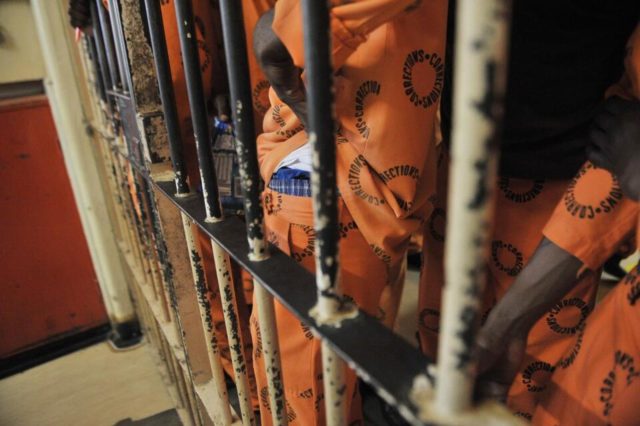The go-ahead for the release of more than 19000 inmates to curb the spread of Covid-19 was allegedly delayed with led to violence erupting.
Johannesburg – Shocking violence has erupted in prisons, owing to alleged government delays in giving the go-ahead for the release of more than 19000 inmates, as a means to curb the spread of the coronavirus in the correctional centres.
The Star has seen graphic videos of about 20 severely injured inmates, with at least two critical cases at Baviaanspoort Medium Prison in Tshwane, following a violent protest about an alleged lack of protection against the deadly Covid-19, which has claimed 58 lives in the country.
Gruesome scenes of bloodied and bruised inmates are visible in the videos, after men in Department of Correctional Services (DCS) uniforms appeared to assault prison protesters to quell the unrest.
The DCS on Monday released a statement calling the inmates’ strike “irresponsible”.
“The Department of Correctional Services must reiterate its deep concern over this form of mobilisation, propagating for chaos inside centres. An action of this nature is unwarranted, as the DCS has been regularly updating the nation on progress in terms of the implementation of our Covid-19 Disaster Management Response Strategy,” read the statement.
The DCS further refuted claims that prisoners were severely injured at the Baviaanspoort prison, when it slammed calls for inmates to go on a hunger strike, as irresponsible.
“Two inmates were treated for minor injuries by our health-care officials and they are back in their cells. This incident has been reported to the relevant authorities, and investigations are under way.”
Meanwhile, The Star has seen internal DCS documents dated April 11, which outline plans to release 19252 “low-risk offenders” to reduce overcrowding in the prisons.
The document states that South Africa has 154945 inmates.
“South Africa declared the state of disaster and the subsequent regulations, issued in terms of the Disaster Management Act, provides among others, for mandatory social distancing and other measures to prevent and combat the spread of Covid-19. The implementation of these provisions in correctional centres and remand detention facilities are challenging, as we are 30% overcrowded,” reads the document.
The criteria to be used to select offenders to be released include sick offenders as declared by health authorities; elderly offenders above the age of 65, excluding lifers; all women excluding those declared dangerous by the court and lifers; and low-risk male offenders approaching a five years’ minimum detention period for placement on parole, on conditions to be determined by the parole boards.
“These offenders should be released, in consultation with the Department of Health, for screening and placement under community policing forums and for monitoring and support.”
The DCS, according to warders across prisons, has yet to screen and test its employees, despite announcing in an internal memo that this process would begin on Monday and end on Friday.
DCS spokesperson Singabakho Nxumalo appeared unhappy with The Star having the secret document.
In a statement to The Star, the DCS said: “It is of great concern to the department that you are in possession of a classified document.
“Section 4 of the Protection of Information Act of 1982 prohibits disclosure of certain information. Subsection 2 says any person who receives any secret official code or password or any document, model, article or information, knowing or having reasonable grounds to believe at the time when he receives it that such code, password, document, model, article or information is being disclosed to him in contravention of the provisions of this act, shall, unless he proves that the disclosure thereof to him was against his wish, be guilty of an offence.
“The person shall be liable on conviction to a fine not exceeding R10000 or imprisonment for a period not exceeding 10 years or to both such fine and imprisonment.”
The Monday statement insisted that the DCS was doing all it can to ensure that inmates and officials are kept safe.
“There has been screening at our centres and supplies are being provided continuously, both for inmates and officials. Improving personal and environmental hygiene, provision of personal protective equipment, sanitisation and decontamination interventions are what we have been doing and continue to do,” read the statement.








